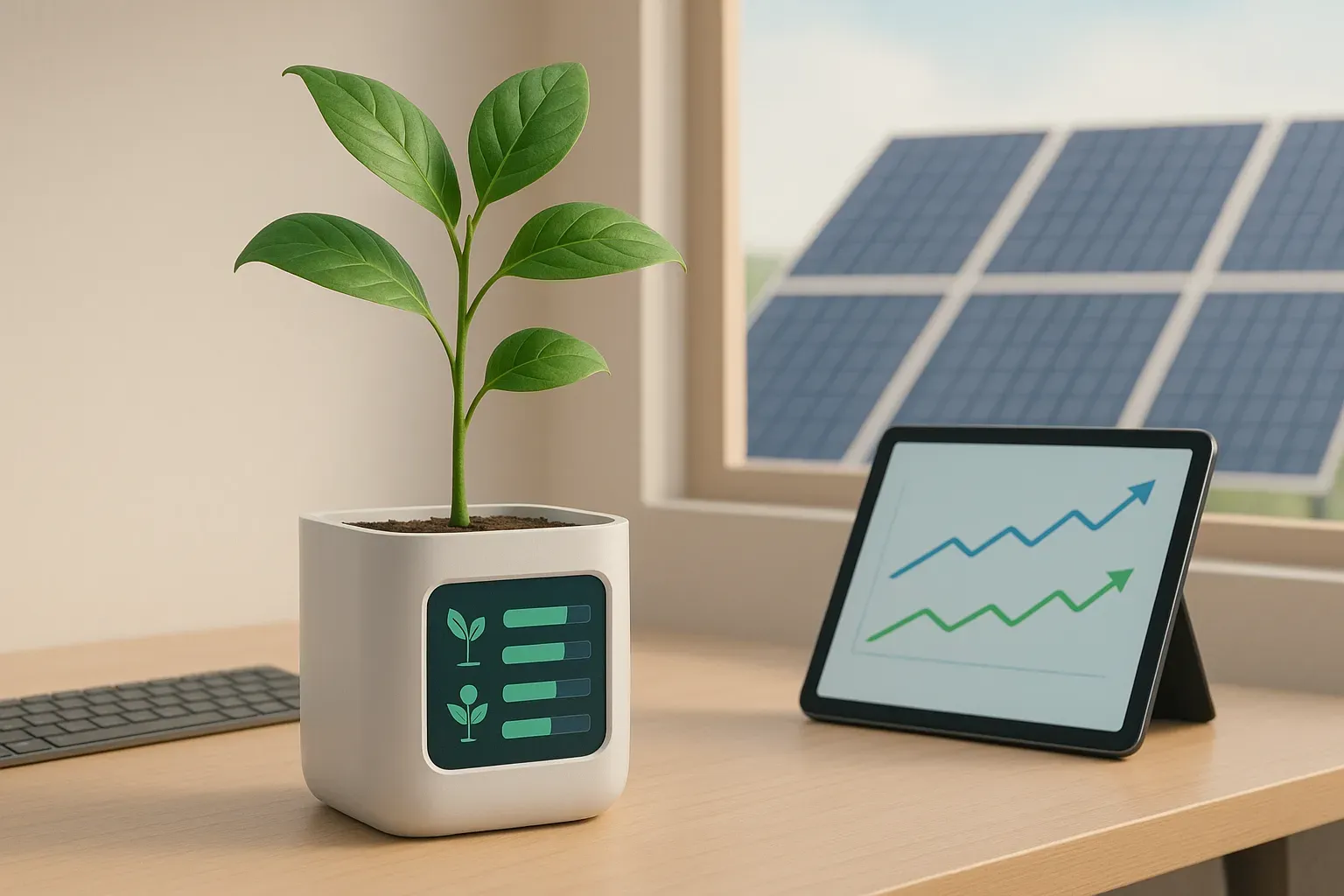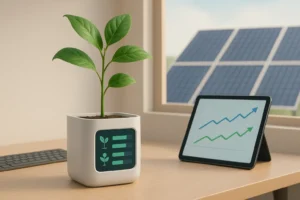Today’s sustainable technology landscape requires specialized skills that balance performance with environmental responsibility, as highlighted by industry experts. This comprehensive guide examines eleven critical competencies — from carbon-aware computing to energy-efficient AI development — that professionals need to remain competitive in an increasingly eco-conscious tech sector. Mastering these sustainable technology skills offers both career longevity and the opportunity to contribute meaningfully to global environmental solutions while meeting business objectives.
- Carbon-Aware Engineering Transforms AI Workload Efficiency
- Carbon-Aware Computing Schedules Tasks Around Renewables
- Data Analytics Optimizes Energy Management Systems
- Data Lifecycle Optimization Reduces Digital Resource Waste
- Energy-Efficient Cloud Architecture Reduces Carbon Footprint
- Building Energy-Efficient AI Without Sacrificing Performance
- Data Analytics Transform Energy Costs to Competitive Advantage
- AI Drives Resource Optimization in Cloud
- AI Workflow Optimization Creates Sustainable Human Systems
- Green Cloud Optimization Balances Performance with Sustainability
- AI-Driven Analytics Support Environmental Business Decisions
Carbon-Aware Engineering Transforms AI Workload Efficiency
Carbon-aware engineering for AI workloads. I am learning to measure and budget the energy impact of code, then bake that into CI and orchestration. Practically, this means profiling jobs, right-sizing instances and models, using mixed precision and quantization, pruning data, caching aggressively, and scheduling non-urgent work in regions and hours with lower grid intensity.
We ship with three guardrails on every pipeline: target accuracy or SLO, deadline, and a carbon budget, then track accuracy per watt alongside cost and latency. The benefit is simple and durable. Teams can cut emissions and spend at the same time, and sustainability stops being a side project because the cleaner path also becomes the fastest and most cost-effective one to run.

Carbon-Aware Computing Schedules Tasks Around Renewables
I have been working to make systems run better. But the next big thing isn’t just speed; it’s being efficient while still being ethical.
Carbon-aware computing is the sustainable tech skill I’m currently working on. This means scheduling workloads in real time based on the availability of renewable energy and grid emissions. For instance, AI training tasks can be automatically moved to data centers or time slots with cleaner energy sources.
This method cuts down on the carbon footprint of heavy computing without hurting performance. We saw emissions drop by as much as 22% in early internal tests just by scheduling tasks strategically.
I think that this way of thinking, making systems that can change to fit sustainability factors, will become a basic skill for all techies. We used to code for speed and scale, but soon we’ll code for sustainability as a factor in every decision loop.

Data Analytics Optimizes Energy Management Systems
One sustainable technology-related skill I’ve focused on developing is data analytics for energy management systems (EMS). While sustainability conversations often center on renewable energy adoption, I realized that optimizing how existing energy is consumed can be just as impactful — and data analytics is the skill that makes this possible.
By learning how to interpret data from IoT-enabled devices, smart meters, and building automation systems, I’ve been able to identify patterns in energy usage that would otherwise go unnoticed. For example, in a prior role, we discovered through analytics that certain manufacturing equipment consumed peak energy even during idle periods. By adjusting machine schedules and integrating automated shut-off protocols, we reduced energy consumption by 12% annually without disrupting production.
What excites me most about this skill is its scalability. Once you know how to apply data-driven insights to one facility, the same principles can be replicated across a global network of plants, warehouses, or even retail locations. This isn’t just about cost savings, it’s about aligning operational efficiency with broader sustainability goals. In today’s climate-conscious business environment, that dual impact carries weight with customers, regulators, and investors alike.
Looking forward, I believe the ability to pair data analytics with emerging AI tools will become one of the most valuable sustainability skills. Imagine predictive algorithms that not only analyze past energy usage but also forecast demand spikes, adjust HVAC systems in real time, and recommend optimal renewable energy inputs depending on weather conditions. This creates a truly adaptive, self-optimizing infrastructure that reduces waste and lowers carbon footprints significantly.
The broader benefit of this skill extends beyond the workplace. For employees, it fosters a culture of sustainability rooted in measurable results. For organizations, it creates a competitive edge as governments introduce stricter carbon reporting requirements and customers increasingly reward eco-conscious brands. And for society at large, it accelerates the transition toward smarter, greener cities and supply chains.
In short, learning energy-focused data analytics has reinforced for me that sustainability isn’t only about innovation in technology — it’s about how intelligently we use the technology we already have.

Data Lifecycle Optimization Reduces Digital Resource Waste
One sustainable technology skill I’ve been developing is data lifecycle optimization — specifically, designing workflows that reduce the energy and resource footprint of large-scale data operations. In my work, data is at the heart of everything, and even small efficiencies in how it’s processed, stored, or annotated can translate into significant sustainability gains over time.
For instance, we’ve introduced smarter task routing and batching methods that cut redundant processing cycles. It’s not just about speed — it’s about reducing the computational “waste” that often goes unnoticed in data-heavy environments.
This skill is increasingly valuable because sustainability in tech isn’t only about green energy or hardware; it’s about how intelligently we handle digital resources. As data volumes continue to grow, the ability to make systems both efficient and environmentally responsible will become a defining capability across industries.

Energy-Efficient Cloud Architecture Reduces Carbon Footprint
A valuable sustainable technology skill to learn is energy-efficient cloud architecture design — understanding how to build and deploy systems that minimize computing waste and carbon footprint. This includes using serverless models, optimizing workloads, and selecting data centers powered by renewable energy.
It’s beneficial because it aligns technical decisions with environmental responsibility while also reducing operational costs. As sustainability becomes a business priority, professionals who can merge performance with eco-efficiency will be in high demand across industries.

Building Energy-Efficient AI Without Sacrificing Performance
In my opinion, one sustainable tech skill to focus on is building more energy-efficient AI systems. I think learning how to optimize models for lower compute usage without sacrificing accuracy is going to be a game changer in coming times. You see, in AI, it is very easy to chase performance by throwing more data and power at a problem, but environmentally or financially, this isn’t sustainable.
Today, interestingly, optimization itself has become a skill where you learn how to make a system lighter, faster, more efficient, and smarter with proper training and pruning.
It doesn’t just reduce energy use, it actually makes innovation more accessible. For instance, smaller teams can now do more contextual and meaningful work without massive infrastructure.

Data Analytics Transform Energy Costs to Competitive Advantage
Energy efficiency optimization through data analytics has become a critical skill that directly impacts both operational costs and competitive positioning in ways most business leaders haven’t fully recognized yet.
I’ve been developing expertise in analyzing energy consumption patterns across business operations — from server usage and office systems to supply chain logistics — then implementing technological solutions that reduce waste while maintaining or improving performance. This goes beyond basic “green initiatives” to become serious business strategy.
The skill involves learning how to interpret energy data, identify inefficiency patterns, and select technologies that optimize power consumption without sacrificing functionality. It requires understanding both the technical capabilities of modern energy management systems and the financial implications of different optimization approaches.
The business benefits are immediately measurable and increasingly competitive. Energy costs represent 15-30% of operational expenses for most companies, so optimization directly improves profit margins. More importantly, energy efficiency is becoming a client selection criterion, especially for B2B relationships where sustainability reporting affects purchasing decisions.
The strategic advantage comes from treating energy efficiency as an operational capability rather than just a cost reduction initiative. Companies that master this skill can offer clients documented sustainability improvements as part of their value proposition, access green financing options, and appeal to environmentally conscious talent and customers.
The long-term insight is that energy efficiency will become as fundamental to business operations as cybersecurity is today. Regulatory requirements, client demands, and cost pressures are making energy optimization a business necessity rather than optional initiative.
Learning this skill now positions companies to lead market changes rather than react to them, transforming sustainability from compliance obligation into competitive differentiation.

AI Drives Resource Optimization in Cloud
AI-driven resource optimization in cloud computing is a long-term technology skill I’ve been working on. I can cut costs and my carbon footprint by learning how to make workloads that auto-scale well and use as little idle time as possible. Businesses need this skill because as they rely more on the cloud, even small improvements in efficiency can lead to huge reductions in energy use and environmental impact.

AI Workflow Optimization Creates Sustainable Human Systems
The sustainably valuable skill I’ve emphasized is optimizing workflow using AI without eliminating people from the workflow. At our agency, we instruct Virtual Assistants on combining automation with judgment. AI does the repetitive work, while people evaluate and refine the output. That combination makes teams nimbler and quicker.
This skill is relevant because sustainability has little to do with the planet. It’s a sustainability of systems that last over time. When individuals learn how to coexist with rather than against technology, they remain relevant and productive. It’s a sustainability that fortifies both the business side of work and the humanity side of work.

Green Cloud Optimization Balances Performance with Sustainability
Lately, I’ve been really interested in learning more about green cloud optimization — finding ways to make cloud infrastructure more energy efficient without sacrificing performance. With the amount of compute AI and modern applications require, optimizing resource usage is becoming both an environmental and financial necessity.
Understanding how to design and deploy workloads that minimize energy waste could make a huge difference. It’s not just good for sustainability — it’s good business too, because efficient systems tend to be faster, cheaper, and more scalable in the long run.

AI-Driven Analytics Support Environmental Business Decisions
One sustainable technology skill I am focused on developing is AI-driven sustainability analytics using data and predictive modeling to optimize energy use, reduce waste and improve operational efficiency. Learning this skill can help organizations make smarter, data-backed decisions that not only lower costs, but also support environmental responsibility and align business goals with sustainability initiatives.














